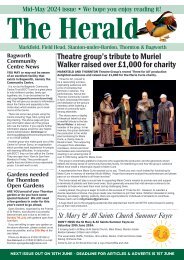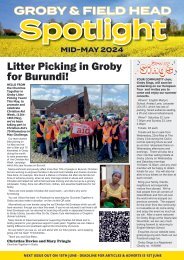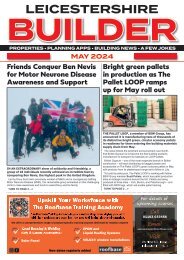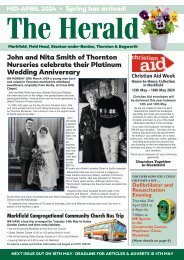APRIL 2024 GROBY SPOTLIGHT online
Groby Spotlight is the free, monthly village magazine for groby, Field Head & The Brantings areas of Leicestershire UK.
Groby Spotlight is the free, monthly village magazine for groby, Field Head & The Brantings areas of Leicestershire UK.
Create successful ePaper yourself
Turn your PDF publications into a flip-book with our unique Google optimized e-Paper software.
18<br />
Groby & Field Head Spotlight • MID-<strong>APRIL</strong> <strong>2024</strong> • Tel: 01530 244069 • Email: info@grobyspotlight.co.uk<br />
UK’s Butterfly Winners and<br />
Losers of 2023 Revealed<br />
THE LATEST RESULTS from the annual UK Butterfly<br />
Monitoring Scheme (UKBMS), led by wildlife charity<br />
Butterfly Conservation, the UK Centre for Ecology &<br />
Hydrology (UKCEH), British Trust for Ornithology (BTO) and<br />
the Joint Nature Conservation Committee (JNCC), show that<br />
2023 was a mixed picture for butterflies, with some species<br />
soaring while others continued worrying declines.<br />
Half the 58 species had a better than average year while the other half<br />
were below average at monitored sites. Species that flourished included<br />
Chequered Skipper, Brimstone, and Large Blue, which all recorded their best<br />
year since the UKBMS began in 1976.<br />
Another species recording its best-ever year was the Red Admiral, a<br />
migratory species that has begun to overwinter in the UK as the climate has<br />
warmed, making it a common<br />
visitor across all habitats, including<br />
gardens. Its numbers have<br />
increased by 318% at monitored<br />
sites since 1976.<br />
At the other end of the scale were<br />
the Small Pearl-bordered Fritillary<br />
and garden favourite the Small<br />
Tortoiseshell, recording their<br />
lowest numbers in the 48 years<br />
of monitoring, declining by 71%<br />
and 82%, respectively since 1976.<br />
Small Tortoiseshell had its worst<br />
year on record in England, second<br />
worst in Wales and joint fifth worst<br />
in Scotland in 2023, but did really<br />
well in Northern Ireland, logging its<br />
second best year.<br />
The Large Blue, which was<br />
reintroduced to the UK after<br />
becoming extinct in the 1970s,<br />
recorded its best year yet, showing<br />
the conservation work with this<br />
species is really working.<br />
Other species that had a<br />
remarkable year include Brown<br />
Argus, Marbled White, Comma,<br />
Black Hairstreak, and Holly Blue,<br />
which all ranked in their top three<br />
best years since 1976. On the other<br />
hand, Cryptic Wood White, Grizzled<br />
Skipper, Pearl-bordered Fritillary,<br />
Grayling and Scotch Argus faced<br />
significant difficulties.<br />
The Green-veined White and<br />
Ringlet both had a poor year,<br />
perhaps suffering ongoing effects<br />
from the drought the previous<br />
summer.<br />
The UKBMS, which began in<br />
1976, is one of the world’s longestrunning<br />
insect monitoring schemes.<br />
Dr Richard Fox, Head of Science<br />
BROOKVALE BLINDS<br />
WOODEN ROMAN PLEATED<br />
H FREE home visit, quote and installation<br />
H Prompt, reliable, local service<br />
H Vertical, Venetian, Roller, Pleated, Roman & Wooden Blinds<br />
H Over 20 Years Experience<br />
Tel: 0116 239 0484 or 07976 572926<br />
Email: gkent54@btinternet.com<br />
at Butterfly Conservation, said:<br />
“Butterfly numbers fluctuate<br />
naturally from year to year, largely<br />
due to the weather, but the longterm<br />
trends of UK butterflies are<br />
mainly driven by human activity,<br />
including habitat damage and<br />
destruction, pesticide use, pollution<br />
and climate change. By monitoring<br />
long-term butterfly trends we can<br />
learn about the impact of climate<br />
change and other factors on our<br />
native wildlife.”<br />
Butterflies are an<br />
indicator species<br />
Dr Marc Botham, Butterfly<br />
Ecologist at the UK Centre for<br />
Ecology & Hydrology, added:<br />
“Butterflies are an indicator species,<br />
meaning they can tell us about the<br />
health of the wider environment,<br />
which makes the UKBMS data<br />
invaluable in assessing the health<br />
of our countryside and natural<br />
world in general. The mixed<br />
results this year emphasise the<br />
need for continued monitoring<br />
and conservation efforts to protect<br />
these important species and their<br />
habitats.”<br />
Dr James Heywood, Breeding<br />
Bird Survey National Organiser at<br />
the British Trust for Ornithology,<br />
whose volunteers contribute to the<br />
UKBMS, commented: “In 2023,<br />
thousands of skilled volunteers<br />
monitored a record-breaking 3,316<br />
sites across the UK, gathering<br />
valuable data that will help to<br />
inform conservation decisions<br />
for the future. We are incredibly<br />
grateful to each and every one of<br />
those people who carry out the<br />
monitoring and help us to maintain<br />
The Large Blue, recorded<br />
its best year yet<br />
this highly valuable study.”<br />
Chris Tuckett, Chief Officer for<br />
Strategy and Impact at JNCC, said:<br />
“The evidence produced through<br />
environmental monitoring, such<br />
as the UK Butterfly Monitoring<br />
Scheme demonstrates the vital role<br />
these schemes play in helping us<br />
understand the effects of pressures<br />
on the natural environment and,<br />
equally importantly, how efforts to<br />
address these pressures through<br />
nature conservation and recovery<br />
can be effective in reversing<br />
decline.<br />
“JNCC has supported these<br />
schemes, which involve thousands<br />
of dedicated volunteers, for over<br />
30 years, and remains committed<br />
to continuing to support them in the<br />
future.”<br />
The UKBMS now records data<br />
on over 3,000 sites per year and<br />
the resulting dataset is a crucial<br />
resource for understanding<br />
changes in insect populations and<br />
has provided significant insights<br />
into almost all aspects of butterfly<br />
ecology.<br />
As the UK faces the ongoing<br />
challenges posed by climate<br />
change and other environmental<br />
pressures, the work of the UKBMS<br />
and organisations like Butterfly<br />
Conservation, the UK Centre for<br />
Ecology & Hydrology, the British<br />
Trust for Ornithology and JNCC<br />
remains essential in monitoring<br />
and protecting precious butterfly<br />
populations and the habitats they<br />
depend on.<br />
You just realized that your age is the number of times you went around the sun.<br />
Roads at<br />
‘breaking point’<br />
HAVE YOU HIT a pothole<br />
and damaged your car yet?<br />
If not, it is probably only a<br />
matter of time.<br />
Despite TWO MILLION potholes<br />
being filled over the past year (the<br />
highest number since 2015) the<br />
Asphalt Industry Alliance (AIA) is<br />
now warning that our roads are<br />
crumbling to ‘breaking point’.<br />
According to the AIA’s annual<br />
survey, only just under half the<br />
roads in England and Wales which<br />
are maintained by local councils are<br />
in good condition. 36 per cent are<br />
adequate and 17 per cent are poor.<br />
Last October the Government said<br />
it would provide £8.3billion of extra<br />
funding over the next 11 years, just<br />
to fix potholes. But the sum needed<br />
to fix the backlog is now at £16.3<br />
billion.<br />
Meanwhile, Simon Williams, the<br />
RAC’s head of policy, warns that the<br />
extra £8.3 billion is “only sufficient<br />
to resurface around 5,000 miles<br />
of road, which is sadly just three<br />
per cent of all council-managed<br />
roads in England.” Yet there are<br />
an estimated 107,000 miles of<br />
roads which are fast reaching the<br />
end of their lives. “The scale of the<br />
problem now facing councils is truly<br />
gargantuan.”<br />
My garage has a wonderful<br />
rescue service.<br />
They think nothing<br />
of coming out in the<br />
middle of the week.
















